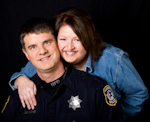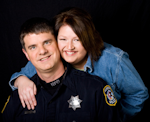How long does it take before a veteran cop knows it all? When does the combination of training and experience achieve perfect mastery? Obviously, the answer “Never! Learning is lifelong and we should always be training” is what most of us would probably offer, if only half believing it ourselves. And while there are many cops who say it and mean it across the decades, a lot of us do settle for complacency after a few years, satisfied we’ve seen and know enough to handle any situation. Outside the occasional mandatory “re-certs” new ideas or ways of doing things are eschewed. “What new tricks can you really teach an old dog like me?” is the question we assume the answer to is “Nothing.”
It’s easy to fall into that type of thinking. I have, when it comes to certain skills and responses, but really it’s that I’m comfortable with how I’ve always done my job and either too anxious or lazy to bother learning something that may require a change in mindset or mastery of strange practices. After 20 years on the job there is little I don’t feel not only confident, if even a little cocky, taking on.
It is true that most routine police responses – to domestic disputes, common complaints and crimes, traffic accidents, and any number of other calls for service we routinely answer – become second nature. Just showing up means we practice and hone our craft day in and day out. Of course, every call is unique, even if 90% similar to the next domestic or crash or burglary we handle so openness to learning and adapting is important. Other skills are perishable – rarely used or practiced only in theoretical settings - and absent regular “real world” reinforcement can slip out-of-mind until unexpectedly needed.
Firearms and deadly force encounters are one example of skill training we regularly receive and are expected to master and maintain competence in but will rarely, if ever, be called on to use. Similar is CPR. I had gone through nearly two dozen CPR trainings, recertifications, and updates before finally having to do it for real. Despite all the training and practice I’d gone through over nearly twenty-one years, finally putting my hands on someone without a pulse left me flooded with doubt. Instinct and training took over and I fell into the rhythm I’d been taught, but freezing would have been easy and I’ve seen plenty of people do just that. We are more likely to have to use lifesaving techniques than deadly force over the course of a career, so ongoing and creative training is a must so we don’t freeze when our lives depend on knowing when and how to shoot, or someone else’s depends on discerning when not to.
Even the more commonly used “less than lethal” force tactics are perishable skills; over time, and as verbal intervention and de-escalation techniques are mastered lessening the likelihood force will be needed in most situations, the confidence necessary can erode. Hesitance and uncertainty threaten our safety. Regular defensive tactics training for even the most experienced veterans is critical for another very important reason a lot of us might not like to admit: We are all getting older! Aging impacts skill retention and whether we will even be able to react the way we could when we first learned to fight like a cop years before. Almost (but not quite) imperceptible but ongoing changes to our physical functioning must be accounted for and overcome.
Consider the following:
The body you are walking around in at 35, 45, or 55 is NOT the same as it was at 25!
Our senses all change as we age with eyesight and hearing beginning a gradual decline by the early to mid-40s. Our eyes don’t focus as quickly as they used to in changing conditions and environments, and low light plays havoc with clarity and perception. Some very high or very low frequency registers may be lost to our ears, and identifying and isolating certain sounds amid ambient noise becomes more difficult. For most of us these changes are subtle and we learn to compensate for routine activities and needs, but will they cost you under the stress of a use-of-force situation?
We also lose strength as we experience a decrease in the number and size of muscle fibers with age. Lower water content in connective tissues (tendons and ligaments) leaves them stiffer and less able to tolerate stress, and therefore more prone to injury. Middle-aged muscles respond slower and with less certainty than before, with a greater risk of injury, when suddenly called into action during an emergency. Worse, the heart is less able to quickly pump large volumes of blood under high stress, risking overwork and even failure.
Law enforcement’s physical toll over time
Law enforcement is a career that exacts a greater physical toll on its professionals than most, while demanding they be able to quickly neutralize sudden and often life-threatening dangers. Eventually even the fittest cops can develop a laundry list of job-related injuries that will nag them for years.
This physical toll is often exacerbated by inertia. A study out of the University of Iowa, published in the Journal of Occupational and Environmental Medicine, found that policing is an overwhelmingly sedentary profession and officers “expended an average of 1.6 ‘metabolic equivalents’ per minute while on duty, which is about the amount of energy used while washing dishes or ironing while standing, or holding a baby while reclining.” For all of how we like to envision ourselves two-fisted, action-oriented crime fighters we’re really not much more “action hero” than most other modern professional careers. The difference, of course, is few actuaries will ever have to bail out from behind their desk to chase a car burglar, and no CPA ever have to wrestle a coked up former college linebacker into cuffs because, well, it’s his job and who else is going to do it?
The combination of cumulative damage accrued over years and a typically sedentary workday that can flip at any time is dangerous. The infrequent but high-intensity, high-risk physical and emotional demands mean officers must be prepared for no matter how routine the job usually is.
Many cops tend toward homeostasis
Whether it is arrogance, laziness, or lack of time and opportunity, too many officers reach a point they shun ongoing training. For that matter, too many departments resist committing time and resources toward ongoing training even when their people want it! Try introducing something new (or, God forbid, revolutionary!) and notice that some will become outright hostile.
Resistance to change puts officers at risk, and especially as they age. Frequent training and drills across the lifespan allow adjustments to accommodate the incremental shifts we all go through. Learning new techniques and tactics, and fine-tuning the old, increases the likelihood of making it through a career not just alive but largely intact. And just because we can accept none of us are getting any younger doesn’t mean being resigned to getting old; it should be a motivator toward greater fitness, better nutrition, seeking new experiences, and a reinvigorated attitude toward learning. A lot has been learned about how and why we age and, with it, how best to age in a way that strength, sensory, and cognitive losses are forestalled or even reversed through lifestyle improvements. Most departments have those seemingly “ageless” cops who are every bit the badass they were 30 years ago and look it. Maybe it’s fortunate genetics but, more likely, maybe they’ve mastered “living and learning young.”
So, if you want to know how an old dog can master new tricks, be as open to learning and practice as if you were a still rookie.

Michael Wasilewski
Althea Olson, LCSW and Mike Wasilewski, MSW have been married since 1994. Mike works full-time as a police officer for a large suburban Chicago agency while Althea is a social worker in private practice in Joliet & Naperville, IL. They have been popular contributors of Officer.com since 2007 writing on a wide range of topics to include officer wellness, relationships, mental health, morale, and ethics. Their writing led to them developing More Than A Cop, and traveling the country as trainers teaching “survival skills off the street.” They can be contacted at [email protected] and can be followed on Facebook or Twitter at More Than A Cop, or check out their website www.MoreThanACop.com.

Althea Olson
Althea Olson, LCSW and Mike Wasilewski, MSW have been married since 1994. Mike works full-time as a police officer for a large suburban Chicago agency while Althea is a social worker in private practice in Joliet & Naperville, IL. They have been popular contributors of Officer.com since 2007 writing on a wide range of topics to include officer wellness, relationships, mental health, morale, and ethics. Their writing led to them developing More Than A Cop, and traveling the country as trainers teaching “survival skills off the street.” They can be contacted at [email protected] and can be followed on Facebook or Twitter at More Than A Cop, or check out their website www.MoreThanACop.com.


